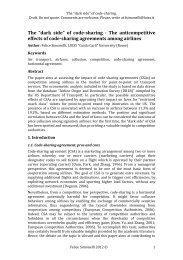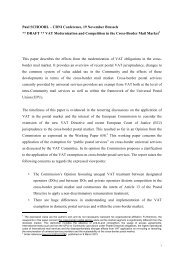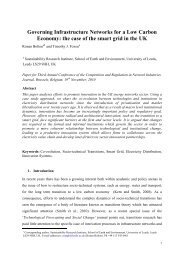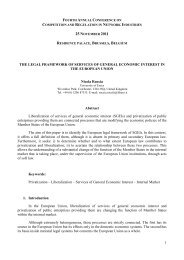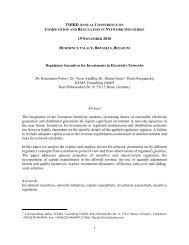Non-discriminatory Third Party Access to the Gas Transmission ...
Non-discriminatory Third Party Access to the Gas Transmission ...
Non-discriminatory Third Party Access to the Gas Transmission ...
You also want an ePaper? Increase the reach of your titles
YUMPU automatically turns print PDFs into web optimized ePapers that Google loves.
under <strong>Gas</strong> law (Article 13 (1b) TGD or/and Article 14 (1a) SGR and national legislation) or<br />
under <strong>the</strong> competition rules. Having stated what type of rule Article 14 (3) SGR provides, <strong>the</strong><br />
following questions must be answered in order <strong>to</strong> clarify how Article 14 (3) can be applied by a<br />
TSO:<br />
1. What does ‘creditworthiness’ mean in Article 14 (3) SGR<br />
2. When is it appropriate <strong>to</strong> ask for a guarantee and when is a guarantee appropriate (and<br />
does not constitute undue market-entry barriers and shall be non-<strong>discrimina<strong>to</strong>ry</strong>, transparent<br />
and proportionate)<br />
Questions (1) and (2) are answered below.<br />
§7.1 What does ‘creditworthiness’ mean in Article 14 (3)<br />
The TGD and <strong>the</strong> SGR do not answer <strong>the</strong> question of what creditworthiness means. For that<br />
reason it is interesting <strong>to</strong> look at common understanding with regard <strong>to</strong> creditworthiness.<br />
According <strong>to</strong> <strong>the</strong> Cambridge dictionary, creditworthy describes someone who has enough money<br />
or property for banks and o<strong>the</strong>r organizations <strong>to</strong> be willing <strong>to</strong> lend <strong>the</strong>m money. The Oxford<br />
dictionary defines creditworthy as: creditworthy (of a person or undertaking) considered suitable<br />
<strong>to</strong> receive credit, especially because of being reliable in paying money back in <strong>the</strong> past.<br />
Fur<strong>the</strong>rmore, <strong>the</strong> Van Dale dictionary uses <strong>the</strong> following description: economically strong<br />
enough <strong>to</strong> get credit. All of <strong>the</strong> above definitions aim at a person/undertaking that wants credit<br />
and has <strong>to</strong> have enough money/property, be suitable or economically strong enough <strong>to</strong> get <strong>the</strong><br />
requested credit. When applying <strong>the</strong>se definitions <strong>to</strong> Article 14 (3) SGR, creditworthiness<br />
probably means that a system user must be economically strong enough, not <strong>to</strong> get credit as such,<br />
but specifically with respect <strong>to</strong> its intended transport obligations. Apart from <strong>the</strong> meaning of <strong>the</strong><br />
word creditworthiness, it is also important <strong>to</strong> look at <strong>the</strong> purpose of Article 14 (3) SGR.<br />
<strong>Non</strong>e<strong>the</strong>less, <strong>the</strong> TGD and <strong>the</strong> SGR do not mention what <strong>the</strong> purpose of <strong>the</strong> provision is. The<br />
following reasons however seem sensible concerning granting or refusing <strong>to</strong> offer/provide TPA<br />
services subject <strong>to</strong> <strong>the</strong> creditworthiness of system users:<br />
(a) In order <strong>to</strong> secure security of supply <strong>to</strong> meet transport obligations (and<br />
prevent unexpected decrease of supply);<br />
26



